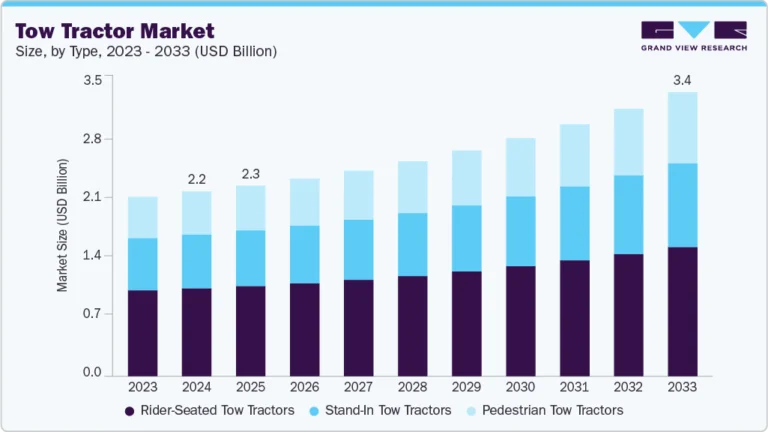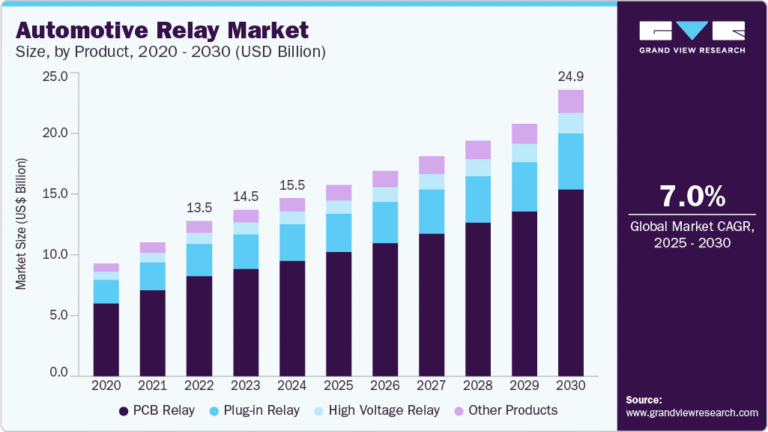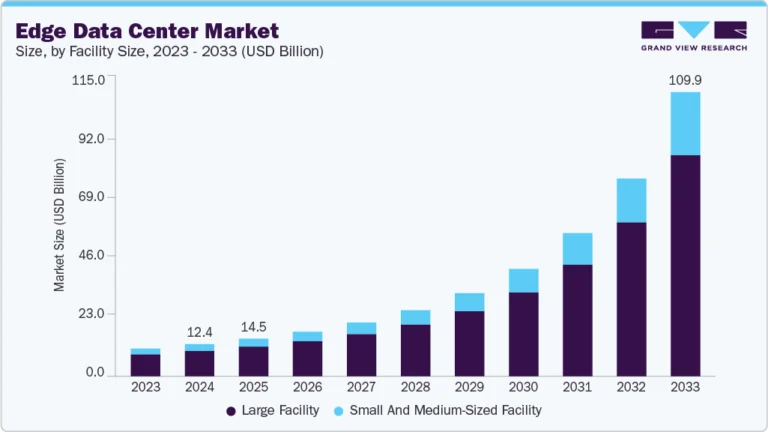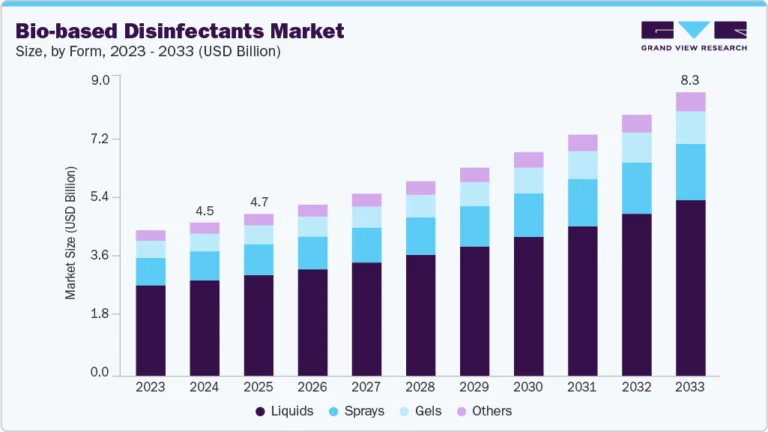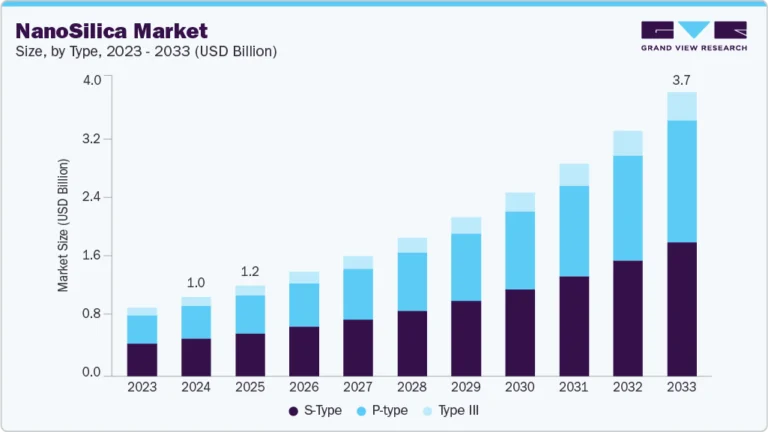Polyester Hot Melt Adhesives Market Size, Share & Trends Analysis growing at a CAGR of 11.4% from 2025 to 2033
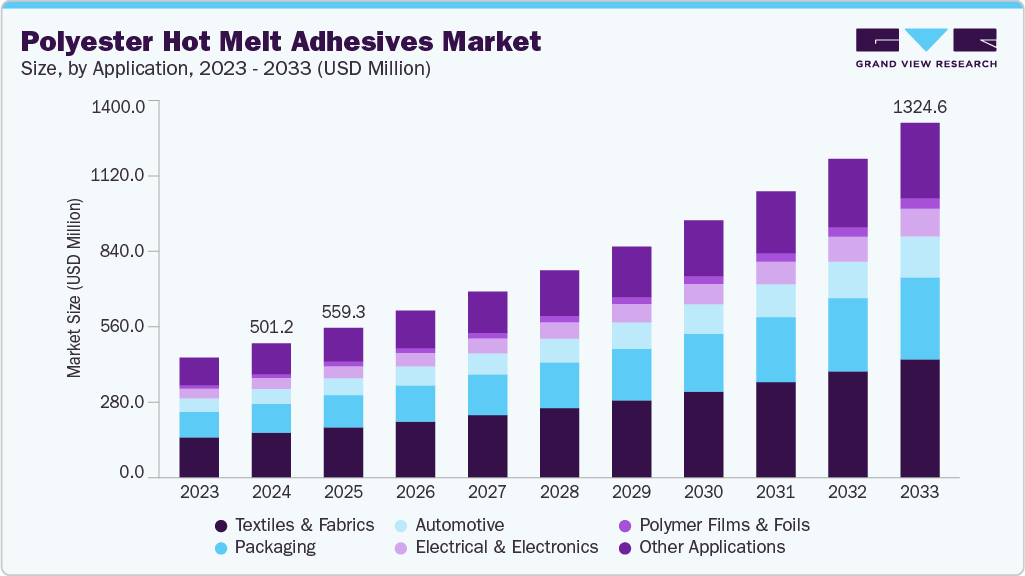
The global polyester hot melt adhesives market size was estimated at USD 501.2 million in 2024 and is projected to reach USD 1324.6 million by 2033, growing at a CAGR of 11.4% from 2025 to 2033, due to the rising demand from the packaging industry is expected to be a key driver of market growth. The packaging segment is anticipated to be the fastest-growing application area throughout the forecast period.
Key Market Trends & Insights
- Asia Pacific dominated the polyester hot melt adhesives market with the largest revenue share of 43.8% in 2024.
- The global polyester hot melt adhesives market is projected to grow at a CAGR of 11.4% from 2025 to 2033.
- By application, textiles & fabrics dominated the polyester hot melt adhesives market with a revenue share of 33.7% in 2024.
- By application, packaging based polyester hot melt adhesives market is expected to witness the fastest growth of 12.4% from 2025 to 2033.
Market Size & Forecast
- 2024 Market Size: USD 501.2 Million
- 2033 Projected Market Size: USD 1,324.6 Million
- CAGR (2025-2033): 11.4%
- Asia Pacific: Largest market in 2024
Request a free sample copy or view report summary: https://www.grandviewresearch.com/industry-analysis/polyester-hot-melt-adhesives-market/request/rs1
The increasing need for flexible packaging in the food and beverage industry, along with the surge in e-commerce and food delivery services, is expected to boost the demand for polyester hot melt adhesives. Additionally, innovations in packaging materials and technologies are further propelling the use of corrugated packaging, particularly in the food and beverage sector. Paper-based packaging and packaged food and beverage products categories, such as dairy, frozen meats and seafood, vegetables, baked goods, ready-to-eat meals, and baking mixes, significantly contribute to the rising need for effective packaging solutions. Polyester hot melt adhesives are gaining popularity in this space due to their strong bonding capabilities, low odor, lightweight nature, and ability to perform across a broad temperature range, making them highly suitable for food packaging.
As consumers, the expanding middle- and upper-middle-class populations in emerging markets such as India and Brazil, coupled with evolving retail landscapes, further propel the need for sustainable and efficient packaging. Additionally, the growth of e-commerce is creating indirect demand for high-performance polyester hot melt adhesives, solidifying their role in modern food and beverage packaging solutions.
Pharmaceutical packaging represents a key growth opportunity for the market and is expected to expand considerably over the next eight years. Developments in biotechnology and the increasing demand for biologic drugs are likely to drive the need for specialized packaging solutions such as pre-fillable syringes and parenteral vials. These trends are anticipated to positively influence the long-term growth of the polyester hot melt adhesives market.
Rising automotive production, particularly in emerging economies across Asia Pacific, the Middle East, and Latin America. Polyester hot melts offer reliable bonding solutions as the industry shifts toward more advanced and decorative interiors, including car seats with integrated electronics and door panels with multi-material components. They are also critical for sound insulation systems and securely attaching heavy-duty rubber mats and fabric linings. The ongoing demand for customized interiors, enhanced comfort, and functional features in vehicles is expected to create significant growth opportunities for polyester hot melt adhesives in the automotive sector.
Driven by rising populations and a growing middle class, these regions are witnessing a surge in vehicle manufacturing. For instance, in April 2024, Henkel announced expansion of its hot melt adhesive production capabilities in Asia, citing strong demand from automotive OEMs for sustainable and high-performance adhesives, including polyester-based variants. This highlights a clear growth trajectory and investment momentum within the automotive adhesive segment, making polyester hot melt adhesives a key focus for manufacturers aiming to meet evolving industry requirements.
Market Concentration & Characteristics
The polyester hot melt adhesives market exhibits a moderately fragmented structure, dominated by a few large multinational chemical companies that are vertically integrated across the value chain. These key players benefit from economies of scale, in-house feedstock processing (such as natural oils or fatty acids), and extensive global supply chains, enabling them to ensure product consistency, cost competitiveness, and supply reliability across high-demand sectors like packaging, automotive, textiles, and consumer goods.
Concurrently, regional and emerging players in Asia-Pacific, Latin America, and the Middle East are steadily gaining market share by capitalizing on low-cost local resources, favorable regulatory environments, and rising domestic demand. Many of these companies are investing in polyester resin and adhesive production infrastructure to serve cost-sensitive, high-volume applications. This dual dynamic, global consolidation by established producers and regional expansion by cost-competitive manufacturers, continues to shape the evolving landscape of the polyester hot melt adhesives market.

